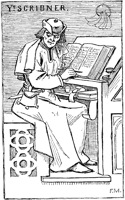Difference between revisions of "Scribes"
m (Text replacement - "http://nordan.daynal.org" to "https://nordan.daynal.org") |
m (Text replacement - "http://" to "https://") |
||
| Line 3: | Line 3: | ||
==Origin== | ==Origin== | ||
[https://nordan.daynal.org/wiki/index.php?title=English#ca._1100-1500_.09THE_MIDDLE_ENGLISH_PERIOD Middle English], from [[Latin]] scriba official [[writer]], from scribere to write; akin to [[Greek]] skariphasthai to scratch an [[outline]] | [https://nordan.daynal.org/wiki/index.php?title=English#ca._1100-1500_.09THE_MIDDLE_ENGLISH_PERIOD Middle English], from [[Latin]] scriba official [[writer]], from scribere to write; akin to [[Greek]] skariphasthai to scratch an [[outline]] | ||
| − | *[ | + | *[https://en.wikipedia.org/wiki/14th_century 14th Century] |
==Definitions== | ==Definitions== | ||
*1: a member of a learned [[class]] in ancient [[Israel]] through [[New Testament]] times [[studying]] the [[Scripture]]s and serving as copyists, [[editors]], [[teachers]], and jurists. | *1: a member of a learned [[class]] in ancient [[Israel]] through [[New Testament]] times [[studying]] the [[Scripture]]s and serving as copyists, [[editors]], [[teachers]], and jurists. | ||
| Line 10: | Line 10: | ||
*3: [[writer]]; specifically : journalist | *3: [[writer]]; specifically : journalist | ||
==Description== | ==Description== | ||
| − | A '''scribe''' is a [[person]] who writes [[books]] or [[documents]] by hand as a profession and helps the city keep track of its [[records]]. The [[profession]], previously found in all literate cultures in some form, lost most of its importance and [[status]] with the advent of [ | + | A '''scribe''' is a [[person]] who writes [[books]] or [[documents]] by hand as a profession and helps the city keep track of its [[records]]. The [[profession]], previously found in all literate cultures in some form, lost most of its importance and [[status]] with the advent of [https://en.wikipedia.org/wiki/Printing printing]. The [[work]] could involve copying [[books]], including [[sacred]] texts, or secretarial and administrative duties such as taking of [[dictation]] and the keeping of [[business]], judicial and historical records for [[kings]], [[nobility]], [[temples]] and cities. Later the profession developed into public servants, journalists, accountants, typists, and lawyers. In [[societies]] with low literacy rates, such as India, street corner letter-writers (and [[readers]]) may still be found providing a service.[https://en.wikipedia.org/wiki/Scribe] |
[[Category: Languages and Literature]] | [[Category: Languages and Literature]] | ||
Latest revision as of 02:35, 13 December 2020
Origin
Middle English, from Latin scriba official writer, from scribere to write; akin to Greek skariphasthai to scratch an outline
Definitions
- 1: a member of a learned class in ancient Israel through New Testament times studying the Scriptures and serving as copyists, editors, teachers, and jurists.
- 2: a : an official or public secretary or clerk
- b : a copier of manuscripts
- 3: writer; specifically : journalist
Description
A scribe is a person who writes books or documents by hand as a profession and helps the city keep track of its records. The profession, previously found in all literate cultures in some form, lost most of its importance and status with the advent of printing. The work could involve copying books, including sacred texts, or secretarial and administrative duties such as taking of dictation and the keeping of business, judicial and historical records for kings, nobility, temples and cities. Later the profession developed into public servants, journalists, accountants, typists, and lawyers. In societies with low literacy rates, such as India, street corner letter-writers (and readers) may still be found providing a service.[1]
